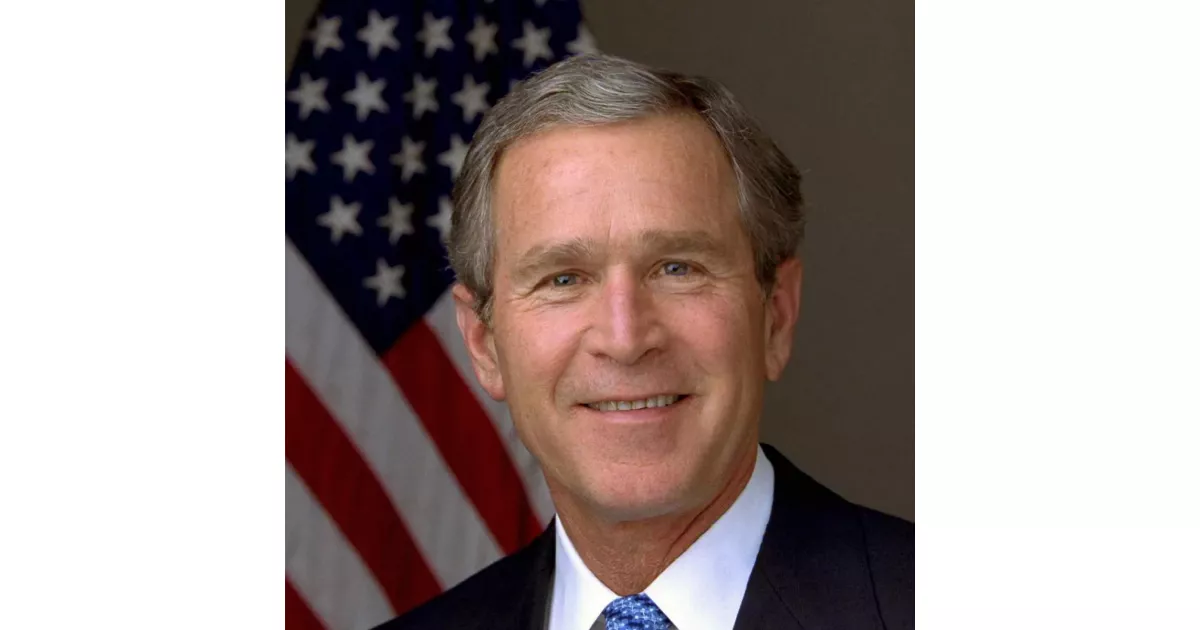How George W. Bush built a successful career. Explore key moments that defined the journey.
George W. Bush, the 43rd U.S. President (2001-2009), is a Republican politician, businessman, and former U.S. Air Force officer. The son of President George H.W. Bush, he previously served as the 46th Governor of Texas (1995-2000). His presidency was largely defined by the September 11th terrorist attacks in 2001, which led to the launch of the War on Terror, including military interventions in Afghanistan and Iraq. Domestically, he enacted education reform legislation known as No Child Left Behind and signed tax cuts into law. His administration also faced criticism for its handling of Hurricane Katrina and the 2008 financial crisis.
May 1968: Joined the United States Air Force
In May 1968, George W. Bush joined the United States Air Force and was commissioned into the Texas Air National Guard.
1972: Suspended from Flying
In 1972, George W. Bush was suspended from flying for failure to take a scheduled physical exam.
1973: Drilled with Alabama Air National Guard
In late 1972 and early 1973, George W. Bush drilled with the 187th Fighter Wing of the Alabama Air National Guard while working on Winton M. Blount's Senate campaign.
November 21, 1974: Honorably Discharged from Air Force Reserve
On November 21, 1974, George W. Bush was honorably discharged from the Air Force Reserve.
1975: Graduated from Harvard Business School
In 1975, George W. Bush graduated from Harvard Business School with an M.B.A. degree, becoming the only U.S. president to have earned the degree.
1977: Established Arbusto Energy
In 1977, George W. Bush established Arbusto Energy, a small oil exploration company.
1978: Ran for U.S. House of Representatives
In 1978, George W. Bush ran for the U.S. House of Representatives from Texas's 19th congressional district but lost the election to Kent Hance.
1978: Arbusto Energy Operations Began
In 1978, operations began at George W. Bush's oil exploration company, Arbusto Energy.
1984: Merger with Spectrum 7
In 1984, George W. Bush's company, Bush Exploration, merged with Spectrum 7, and Bush became chairman.
1988: Moved to Washington, D.C.
In 1988, George W. Bush and his family moved to Washington, D.C., to work on his father's campaign for the U.S. presidency.
April 1989: Arranged Purchase of Texas Rangers
In April 1989, George W. Bush arranged for a group of investors to purchase a controlling interest in the Texas Rangers Major League Baseball team.
December 1991: Named Advisor to Father's Re-Election Campaign
In December 1991, George W. Bush was named as one of the advisors to his father's 1992 presidential re-election campaign.
1992: Father's Re-Election Campaign
In 1992, George W. Bush was one of seven people named by his father to run his father's 1992 presidential re-election campaign as a campaign advisor.
1994: Candidacy for Texas Gubernatorial Election
In 1994, George W. Bush declared his candidacy for the Texas gubernatorial election.
1998: Won Re-election as Governor
In 1998, George W. Bush won re-election as governor of Texas with a record 68 percent of the vote.
1998: Sale of Texas Rangers Shares
In 1998, George W. Bush's sale of his shares in the Texas Rangers brought him over $15 million from his initial investment.
1999: Signed Law Promoting Renewable Energy
In 1999, George W. Bush signed a law requiring electric retailers to buy a certain amount of energy from renewable sources, which helped Texas become a leading producer of wind power.
July 25, 2000: Bush selects Dick Cheney as running mate
On July 25, 2000, George W. Bush selected Dick Cheney as his running mate for the upcoming presidential election. At the time, Cheney was the head of Bush's vice presidential search committee.
2000: Campaigning for President
In 2000, George W. Bush campaigned for President, portraying himself as a compassionate conservative.
2000: Won the Presidential Election
In 2000, George W. Bush won the presidential election against Al Gore, despite losing the popular vote and a Supreme Court decision halting a recount in Florida.
2000: End of Bush's Governorship
In 2000, George W. Bush's term as the governor of Texas came to an end.
2000: Speculation about Presidential Candidacy
Throughout George W. Bush's first term as governor, he was the focus of national attention as a potential future presidential candidate; following his re-election in 1998, speculation soared, and within a year he decided to seek the 2000 Republican presidential nomination.
April 2001: Hainan Island Incident
In April 2001, George W. Bush expressed U.S. support for the defense of Taiwan following the stand-off with China over the Hainan Island incident, where a U.S. surveillance aircraft collided with a People's Liberation Army Air Force jet, leading to the detention of U.S. personnel.
May 2001: Executive Orders on Energy and Environment
In May 2001, George W. Bush signed an executive order to create an interagency task force to streamline energy projects, and later signed two other executive orders to tackle environmental issues.
August 9, 2001: Executive Order on Stem Cell Research Funding
On August 9, 2001, President Bush signed an executive order that lifted the ban on federal funding for research on the existing 71 "lines" of stem cells. However, the ability of these existing lines to provide an adequate medium for testing has been questioned.
October 7, 2001: Initiation of Bombing Campaigns in Afghanistan
On October 7, 2001, U.S. and British forces initiated bombing campaigns in Afghanistan, leading to the arrival of Northern Alliance troops in Kabul on November 13. The main goals of the war were to defeat the Taliban and drive al-Qaeda out of Afghanistan.
December 2001: Taliban Defeat Reported, Continued War Cautioned
In December 2001, the Pentagon reported that the Taliban had been defeated in Afghanistan, but cautioned that the war would continue to weaken Taliban and al-Qaeda leaders. Later that month, the UN installed the Afghan Transitional Administration chaired by Hamid Karzai.
2001: Beginning of Condoleezza Rice's Tenure as National Security Advisor
In 2001, Condoleezza Rice began her tenure as George W. Bush's National Security Advisor, serving until 2005.
2001: Bush Becomes President
In 2001, George W. Bush became the 43rd president of the United States.
January 29, 2002: State of the Union Address and the "Axis of Evil"
In his State of the Union Address on January 29, 2002, President Bush asserted that an "axis of evil" consisting of North Korea, Iran, and Ba'athist Iraq was "arming to threaten the peace of the world".
November 2002: UN Weapons Inspectors in Iraq
In November 2002, Hans Blix and Mohamed ElBaradei led UN weapons inspectors in Iraq, but were advised by the U.S. to depart the country four days prior to the U.S. invasion, despite their requests for more time to complete their tasks.
2002: Withdrawal from Anti-Ballistic Missile Treaty
In 2002, George W. Bush withdrew U.S. support for the Anti-Ballistic Missile Treaty (ABM) with Russia, marking the first time the U.S. had withdrawn from a major international arms treaty in post-World War II history. Vladimir Putin, the Russian president, stated that this American withdrawal from the ABM Treaty was a mistake.
2002: No Child Left Behind Act Signed into Law
In early 2002, George W. Bush signed the No Child Left Behind Act into law, which aimed to measure and close the gap between rich and poor student performance, provide options to parents with students in low-performing schools, and target more federal funding to low-income schools.
January 2003: State of the Union address: PEPFAR outlined
In January 2003, George W. Bush announced a five-year strategy for global emergency AIDS relief, known as the President's Emergency Plan for AIDS Relief (PEPFAR), during the State of the Union address. Bush pledged $15 billion for the initiative.
March 20, 2003: Invasion of Iraq
On March 20, 2003, the United States, along with the "coalition of the willing", initiated the invasion of Iraq. The Iraqi military was quickly defeated.
April 9, 2003: Fall of Baghdad
On April 9, 2003, Baghdad, the capital of Iraq, fell to U.S. forces during the invasion of Iraq.
2003: Medicare Act of 2003 Signed into Law
In 2003, George W. Bush signed the Medicare Act of 2003, which included major changes to the Medicare program by providing beneficiaries with assistance in paying for prescription drugs and relying on private insurance for the delivery of benefits.
2003: Withdrawal of U.S. Troops from Saudi Arabia
In 2003, the U.S. withdrew most of its troops from Saudi Arabia.
2004: Bush's Re-election Campaign
In 2004, George W. Bush campaigned for re-election with broad Republican support. He emphasized commitment to the wars in Iraq and Afghanistan, support for the USA PATRIOT Act, constitutional amendments banning abortion and same-sex marriage, reforming Social Security, creating an ownership society, and opposing mandatory carbon emissions controls. He also proposed a guest worker program for immigrants.
2004: Bush Re-elected as President
In 2004, George W. Bush was re-elected as president, defeating John Kerry.
2004: Nomination of Porter Goss and CIA Purge
In 2004, following the resignation of CIA director George Tenet, George W. Bush nominated Porter Goss to head the agency. The White House ordered Goss to purge agency officers who were disloyal to the administration, leading to the firing or resignation of many senior CIA agents. The CIA was also accused of leaking classified information to undermine the 2004 election.
January 2005: Iraqi Elections
In January 2005, Iraq held elections recognized by the West as free and fair for the first time in 50 years, leading to the election of Jalal Talabani as president and Nouri al-Maliki as Prime Minister of Iraq.
July 19, 2005: Bush nominates John Roberts to Supreme Court
On July 19, 2005, George W. Bush nominated federal appellate judge John Roberts to replace Associate Justice Sandra Day O'Connor, who had retired on July 1.
September 29, 2005: Roberts confirmed as Chief Justice
On September 29, 2005, John Roberts was confirmed by the Senate as the next Chief Justice of the United States, after Bush withdrew his nomination as O'Connor's replacement following the death of Chief Justice William Rehnquist.
October 3, 2005: Bush nominates Harriet Miers to Supreme Court
On October 3, 2005, George W. Bush nominated White House Counsel Harriet Miers to succeed Sandra Day O'Connor as Associate Justice of the Supreme Court.
October 2005: Referendum on Iraqi Constitution
In October 2005, a referendum was held in Iraq to approve a new constitution, supported by most Shiites and many Kurds.
November 1, 2005: Launch of National Strategy for Pandemic Influenza
On November 1, 2005, George W. Bush launched a National Strategy for Pandemic Influenza.
2005: Condoleezza Rice Becomes Secretary of State
In 2005, Condoleezza Rice became George W. Bush's Secretary of State, serving until 2009.
January 31, 2006: Alito confirmed to Supreme Court
On January 31, 2006, Samuel Alito was confirmed by the Senate to replace Sandra Day O'Connor as Associate Justice of the Supreme Court, after Harriet Miers withdrew her nomination.
March 2006: Bush Visits India Focusing on Nuclear Energy and Counter-Terrorism
In March 2006, President Bush visited India, focusing on nuclear energy, counter-terrorism cooperation, and discussions that would eventually lead to the India–United States Civil Nuclear Agreement.
May 2006: Publication of Pandemic Influenza Implementation Plan
In May 2006, the Homeland Security Council published an implementation plan for the National Strategy for Pandemic Influenza.
July 19, 2006: First Presidential Veto: Stem Cell Research Enhancement Act
On July 19, 2006, President Bush used his veto power for the first time in his presidency to veto the Stem Cell Research Enhancement Act. The bill would have repealed the Dickey–Wicker Amendment, thereby permitting federal money to be used for research where stem cells are derived from the destruction of an embryo.
October 9, 2006: North Korea's Nuclear Detonation
On October 9, 2006, North Korea's detonation of a nuclear device complicated President Bush's foreign policy.
October 17, 2006: Signing of Military Commissions Act
On October 17, 2006, President Bush signed the Military Commissions Act of 2006 into law, allowing the U.S. government to prosecute unlawful enemy combatants by military commission and denying detainees access to habeas corpus while barring torture.
2006: Creation of Papahānaumokuākea Marine National Monument
In 2006, President Bush declared the Northwestern Hawaiian Islands a national monument, creating the largest marine reserve to date. The Papahānaumokuākea Marine National Monument comprises 84 million acres and is home to 7,000 species of fish, birds, and other marine animals.
2006: Bush Urges Congress to Allow Illegal Immigrants to Work in the U.S.
In 2006, President Bush urged Congress to allow more than twelve million illegal immigrants to work in the United States with the creation of a "temporary guest-worker program".
2006: State of the Union Address: "America is addicted to oil"
In his 2006 State of the Union Address, President Bush declared, "America is addicted to oil" and launched his Advanced Energy Initiative to increase energy development research.
January 10, 2007: Troop Surge in Iraq
On January 10, 2007, President Bush initiated a surge of 21,500 additional troops to Iraq, along with a job program and reconstruction proposals, allocating $1.2 billion for these programs.
March 2007: Additional Troops to Afghanistan
President Bush commissioned 3,500 additional troops to Afghanistan in March 2007.
May 1, 2007: Veto of Troop Withdrawal Bill
On May 1, 2007, President Bush vetoed a bill that set a deadline for the withdrawal of U.S. troops from Iraq, insisting that a continued U.S. presence was crucial.
May 7, 2007: North Korea Agrees to Shut Down Nuclear Reactors
On May 7, 2007, North Korea agreed to shut down its nuclear reactors immediately pending the release of frozen funds held in a foreign bank account, a result of three-way talks initiated by the United States and China.
June 2007: Bush Supports Comprehensive Immigration Reform Act of 2007
From May to June 2007, President Bush strongly supported the Comprehensive Immigration Reform Act of 2007, which was written by a bipartisan group of senators with the active participation of the Bush administration. The bill envisioned a legalization program for illegal immigrants, with an eventual path to citizenship.
September 2, 2007: North Korea Agrees to Dismantle Nuclear Programs
On September 2, 2007, North Korea agreed to disclose and dismantle all its nuclear programs by the end of 2007.
November 2007: Treasury Department Freezes Assets
In November 2007, the Treasury Department, acting under executive orders signed in 2004 and later in 2007 by George W. Bush, froze the assets of two Lebanese and two Syrians, accusing them of activities to "undermine the legitimate political process in Lebanon".
2007: State of the Union Address: Renewed Pledge on Foreign Oil Reliance
In his 2007 State of the Union Address, President Bush renewed his pledge to work toward diminished reliance on foreign oil by reducing fossil fuel consumption and increasing alternative fuel production.
March 8, 2008: Veto of Intelligence Oversight Bill
On March 8, 2008, President Bush vetoed H.R. 2082, a bill that would have expanded congressional oversight over the intelligence community and banned the use of waterboarding and other interrogation methods, arguing it would remove a valuable tool in the War on Terror.
March 2008: Praise for Iraqi Government's Action
In March 2008, President Bush praised the Iraqi government's "bold decision" to launch the Battle of Basra against the Mahdi Army, calling it "a defining moment in the history of a free Iraq".
May 21, 2008: Signing of Genetic Information Nondiscrimination Act
On May 21, 2008, George W. Bush signed into law the Genetic Information Nondiscrimination Act, which protects Americans against health insurance and employment discrimination based on genetic information.
June 2008: Bush Calls on Congress to Expand Domestic Oil Production
Amid high gasoline prices in June 2008, President Bush stated, "In the long run, the solution is to reduce demand for oil by promoting alternative energy technologies... In the short run, the American economy will continue to rely largely on oil. And that means we need to increase supply, especially here at home. So my administration has repeatedly called on Congress to expand domestic oil production."
July 2008: Withdrawal of American Forces
By July 2008, due to increased stability in Iraq and lowered American troop deaths, President Bush withdrew additional American forces from the country.
2008: Support for Ukraine and Georgia Joining NATO
In early 2008, President Bush vowed full support for admitting Ukraine and Georgia into NATO despite Russia's opposition to the further enlargement of NATO. During the 2008 Russo-Georgian diplomatic crisis, Bush condemned Russia for recognizing the separatist government of South Ossetia. When Russian troops invaded Georgia later that summer, Bush said: "Bullying and intimidation are not acceptable ways to conduct foreign policy in the 21st century."
2008: Commitment to International Clean Energy Fund
In his 2008 State of the Union Address, President Bush committed $2 billion over the next three years to a new international fund to promote clean energy technologies and fight climate change.
2009: End of Condoleezza Rice's Tenure as Secretary of State
In 2009, Condoleezza Rice's tenure as George W. Bush's Secretary of State came to an end.
2009: Bush's Presidency Ends
In 2009, George W. Bush's presidency ended.
January 2010: Establishment of Clinton Bush Haiti Fund
In January 2010, at President Obama's request, George W. Bush and Bill Clinton established the Clinton Bush Haiti Fund to raise contributions for relief and recovery efforts after the 2010 Haiti earthquake.
November 9, 2010: Release of "Decision Points"
On November 9, 2010, George W. Bush released his memoirs, titled "Decision Points." During a pre-release appearance, Bush identified keeping the country safe as his biggest accomplishment and failing to secure Social Security reform as his greatest failure. He also defended his administration's enhanced interrogation techniques, including the waterboarding of Khalid Sheikh Mohammed.
2011: Criticism of Troop Withdrawal from Iraq
In 2011, George W. Bush vocally disagreed with President Obama's withdrawal of U.S. troops from Iraq, calling it a "strategic blunder".
2013: PEPFAR saves five million lives
By 2013, The U.S. government had spent $44 billion on PEPFAR, and it was estimated that the initiative had saved five million lives since 2003. Peter Baker of The New York Times noted that "Bush did more to stop AIDS and more to help Africa than any president before or since."
June 12, 2015: Comments on ISIS and Iraq
In an interview published on June 12, 2015, by Israel Hayom magazine, George W. Bush stated that "boots on the ground" would be necessary to defeat ISIS. He also defended his decision to send additional troops to Iraq during his presidency to defeat Al Qaeda.
February 2017: Release of "Portraits of Courage"
In February 2017, George W. Bush released "Portraits of Courage", a book of his own portraits of veterans.
September 7, 2017: Bush partners with former presidents for hurricane relief
On September 7, 2017, George W. Bush joined Jimmy Carter, George H.W. Bush, Bill Clinton, and Barack Obama to form One America Appeal, aiding victims of Hurricane Harvey and Hurricane Irma in the Gulf Coast and Texas.
May 2019: Bush draws portrait of Roh Moo-hyun
In May 2019, George W. Bush drew a portrait of former South Korean president Roh Moo-hyun to give to his family on the tenth anniversary of Roh's death.
July 14, 2021: Reaffirmation of Opposition to Troop Withdrawal from Afghanistan
During an interview with Deutsche Welle on July 14, 2021, George W. Bush reaffirmed his opposition to President Biden's withdrawal of American troops from Afghanistan, calling the plan "a mistake."
2023: PEPFAR estimated to have saved over 25 million lives
By 2023, PEPFAR was estimated to have saved over 25 million lives, alleviating the severity of the HIV/AIDS epidemic especially in Sub-Saharan Africa, and was called "George W. Bush's greatest accomplishment" by Vox.
Mentioned in this timeline

Donald John Trump is an American politician media personality and...

Michelle Obama an American attorney and author served as the...

Barack Obama the th U S President - was the...

Bill Clinton the nd U S President - served as...
Ukraine is a country in Eastern Europe the second-largest on...

Joe Biden is an American politician who served as the...
Trending
51 minutes ago Tim NeCastro Announces Retirement as Erie Insurance CEO After 10 Years

3 hours ago Apple MacBook Pro: Touchscreen, Dynamic Island, and New Interface Coming Soon.

3 hours ago Microsoft and SpaceX Starlink Partner to Empower Global Community Internet and AI Economy
52 minutes ago Trump Announces Energy Deals and Rate Payer Protection Pledges at SOTU
3 hours ago Whitefox & Fluid Quip collaborate; Low-carbon ethanol boosted; Indoor plants aid climate resilience.

2 hours ago Ethereum Price Faces Resistance at $1,950 Amidst Market Repricing Concerns.
Popular

Jesse Jackson is an American civil rights activist politician and...

Susan Rice is an American diplomat and public official prominent...

Barack Obama the th U S President - was the...

Michael Joseph Jackson the King of Pop was a highly...

XXXTentacion born Jahseh Dwayne Ricardo Onfroy was a controversial yet...

Bernie Sanders is a prominent American politician currently serving as...


